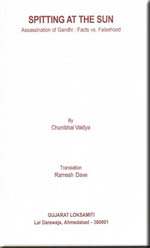
P.O. SEVAGRAM, DIST.WARDHA 442102, MS, INDIA. Phone: 91-7152-284753
FOUNDED BY MAHATMA GANDHI IN 1936
The Spitting At The Sun
[ Assassination of Gandhi : Facts vs. Falsehood ]

SPITTING AT THE SUN
(Assassination of Gandhi :
Facts vs. Falsehood)
Written by :Chunibhai Vaidya
Table of Contents
- Tell The World
- Light Beyond Darkness
- A Word or Two
- Some Points Dealt With In This Book
- Dialogue
- Epilogue
- Appendix 1 : Gandhiji's Speech At The Prayer Meeting
- Appendix 2 : Gandhiji's Speech At The Prayer Meeting
- Appendix 3
- Appendix 4
- Appendix 5
- Charge-Sheet
- About The Author
About This Book
Written by :Chunibhai Vaidya
Translated by :Ramesh Dave
Printed by : Umiya Offset,
Tavdipura,
Ahmedabad - 380 014,
India.
First Published :
November 1998
Printed and Published by :
Gujarat Loksamiti,
Loksamiti Compound
Lal Darwaja,
Ahmedabad - 380 001
Download
About The Author
Dr. Pravin Sheth
Shri Chunibhai Vaidya is a committed sarvodaya worker. Even at 88, Shri Vaidya, as an able leader of Gujarat Lok Samiti, continues to make significant contribution to the fields of water management, land to the landless, Gandhian thought and action, secularism and equitable development.
Inspired by Gandhi's struggle for freedom, Shri Vaidya left formal education to get experience in the school of life. Remaining underground, he worked against the British Raj during the Quit India Movement. He then joined Shri Vinoba Bhave's Bhoodan Movement. Along with Narayan Desai and Prabodh Choksi, he was one of the founders of Yajnya Prakashan Samiti, and later on he edited 'Bhoomiputra'.
Twice, he had lived in Kashi to look after the publications of Sarva Seva Sangh. During Shri Vinobaji's Assam Yatra, he went to Assam. Meanwhile, in the wake of the Chinese aggression, following Vinobaji's directive, he stayed on there for twelve years. On his return to Gujarat, he worked as the editor of 'Bhoomiputra'. Its role as the fearless voice against the Emergency landed him into jail for seven months. 'Bhoomiputra' made history by winning the case against pre-censorship of the government.
Shri Vaidya then took up the leadership of Gujarat Lok Samiti and led many a successful battle on issues like pension of Gujarat MLAs, and closure of the liquor shop at Ratanpur. As an active member of the peace committee of the Nagarika Sangathan, he contributed to restoring peace and bringing about the amicable settlement of the dispute around reservation issue during the turbulent agitation of 1985 in Gujarat.
Shri Vaidya's perseverance is reflected in his half a decade long successful struggle to attain the riparian rights of communities living in the downstream region of the river Banas. He initiated the modified concept of the hidden dam in the Sipu-Banas areas. Such dams have become symbols of grass-root development for water conservation. More than 10,000 Bighas of land areirrigated by these dams.
On behalf of the Sarva Seva Sangh, and Gujarat Sarvoday Mandal, he successfully carried out the movement against the multinational Cargill Corporation. The Gujarat government had sold public land of 200 Bighas in Kadadara village to an MNC. He led the villagers' struggle against such a deal, which forced the government to abandon it. And he still leads number of movements on the issues of justice to the poor, communal harmony, land to the landless, a mega-port etc.
His sensitivity developed while undertaking relief work in the arid regions of Gujarat during 1986-88; and the awareness about the scarce water resources led him to support the Sardar Sarovar Narmada Project and carry out pro-dam movement.
He undertook rehabilitation of 230 plus riot affected families in Gujarat in 2002 post Godhara riots and helped reconstruction work in Kutch, post Kutch earthquake.
Recently the virus of communalism is systematically sought to be spread by the champions of Nathuram Godse, the assassin of Mahatma Gandhi. This has led Shri Vaidya to write a booklet in Gujarati as an ideational counterpoint, which, by now, has been translated and published in eleven languages.
Shri Vaidya has succeeded in reviving our faith in Gandhi at a time when we need to follow him the most.